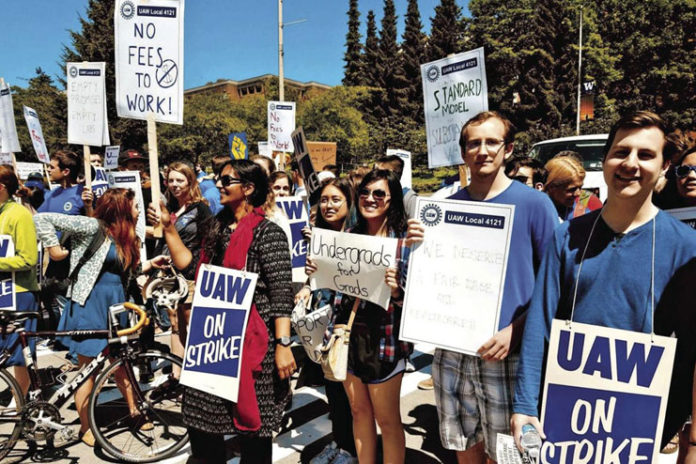Seattle council member Kshama Sawant leads a protest outside the University of Washington. Sawant joined the university labor leaders to demand anti-discrimination training, departmental equity committees, strengthened protections for all workers from discrimination and harassment, and health benefit equity for their trans members.
On the one side is Amazon, America’s largest corporation with a market cap of $885 billion under the leadership of Jeff Bezos, arguably the richest person in the world. On the other side stands Kshama Sawant, the sole socialist elected to the Seattle City Council, an Indian-American, with reputation as a firebrand who stands her ground.
For months, the two have gone head-to-head over what has come to be known as the Amazon Tax, a corporate wealth tax by the council on the largest e-commerce company to help fund solutions to the city’s homelessness.
On the one side is Amazon, America’s largest corporation with a market cap of $885 billion under the leadership of Jeff Bezos, arguably the richest person in the world. On the other side stands Kshama Sawant, the sole socialist elected to the Seattle City Council, an Indian-American, with reputation as a firebrand who stands her ground.
For months, the two have gone head-to-head over what has come to be known as the Amazon Tax, a corporate wealth tax by the council on the largest e-commerce company to help fund solutions to the city’s homelessness.
Last fall, Sawant first demanded taxing the city’s biggest businesses to raise $150 million annually to fund affordable housing and expand homeless services. The proposal created animosity between big businesses and the workers’ movement comprising organizations and coalitions backing the 44-year-old lawmaker.
Matters came to a head early this year when Amazon, headquartered in Seattle, where it is the city’s biggest employer, threatened to pull out from its construction of a second office tower in downtown. It cited the tax plan, under which Amazon and other big companies would pay $500-per-employee tax to the city for five years toward the homeless-shelter initiative.
By Lokesh













































